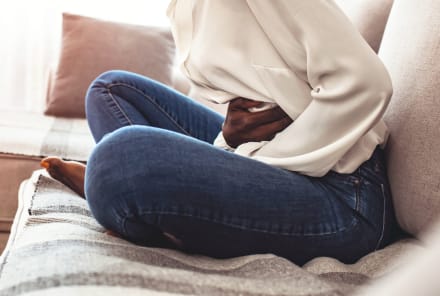Advertisement
Is Being A "Bad Sleeper" Genetic? Here's What The Science Says


Are you a good sleeper? With about 30% of adults1 struggling with a short-term sleep disorder and around 10% experiencing a long-term one—a fair number of people would answer that question with a no.
If you've struggled to sleep for as long as you can remember, you might be tempted to think that being a bad sleeper is written into your DNA. But is that really true? Or do your environment and lifestyle have more of an influence on sleep than you realize?
I sat down with two top sleep experts to dive into the fascinating genetics of sleep and all we can do to optimize them.
Sleep: Nature or nurture?
The great nature-or-nurture debate boils down to the power of genetics versus the power of your environment. It's often used in regard to chronic illness. People want to know if they are destined to develop an illness (i.e., breast cancer, Alzheimer's, or alcoholism) because it runs in their family or if they can set up their lifestyle and environment in a way that overpowers the genetic risk.
When it comes to some illnesses, we find that the environment plays an incredibly strong role. For example, only about 5% of cancers2 can be explained by genetics alone.
But what about when it comes to sleep? Are some of us really destined to be "bad sleepers" thanks to our DNA—or do our environment and lifestyle affect our rest more than we realize?
According to sleep psychologist Joshua Tal, Ph.D., "The idea of being a 'bad sleeper' does have merit in genetics." In other words, if you have a parent or a grandparent who has trouble sleeping, you're definitely more likely to experience the same.
"There is a growing body of research showing that genes do play a role in sleep timing, sleep quantity, and sleep quality," Nishi Bhopal, M.D., a board-certified psychiatrist and sleep doctor, adds. "We know that genes influence how much sleep a person might need and also the timing of sleep, meaning whether they're a night owl or early bird."
According to Bhopal, genetics may also account for 31% to 58%3 of a person's likelihood of experiencing insomnia, although there's still a lot more to learn before we can perform genetic testing for insomnia in an everyday doctor's office.
Can you go from a "bad sleeper" to a good sleeper?
Despite the fact that there are genetic factors at play when it comes to sleep, this doesn't mean that anyone is destined to a lifetime of being a "bad sleeper."
We know that in general, the way we live our lives has a massive impact on our health. For instance, a groundbreaking study published in 2020 showed that five lifestyle factors could reduce the risk of dying prematurely by 38%—regardless of genetics. Sleep is no different. "Genes are not your destiny," says Bhopal.
"Even if someone has genes that predispose them to insomnia, it doesn't mean they're destined to experience insomnia. With preventive measures and interventions, gene expression can be modified," she continues.
Tal explains this in terms of the diathesis-stress model4—a psychological theory that explains one's likelihood of getting a disease they are predisposed to. "You could have a gene for a particular illness, but that doesn't mean the gene is activated. It's essentially a seed for a gene," he explains. Some stressors are able to set off that gene, but whether or not it goes off depends on genetic and environmental factors.
"This means that having a genetic predisposition doesn't mean you will have horrible sleep. It means you have the chance for that," Tal says. In other words, the quality of your sleep is at least partially in your control.
5 ways to optimize your sleep
So, how do you optimize your environment in a way that reduces your chances of sleep issues or helps improve existing problems with sleep? These five tips will get you started:
Change your mindset
Having an "I'm a bad sleeper" mindset can do more harm than good and become a self-fulfilling prophecy. "If someone believes they're a 'bad sleeper,' then they might start to engage in behaviors that make sleep worse, like trying harder to sleep, becoming anxious about sleep, using caffeine to stay awake during the day, or using alcohol or cannabis for sedation at night," Bhopal explains.
"The sleep issue might be genetic at first, but it's usually kept alive by your thoughts and actions around sleep," adds Tal.
To break free from this vicious cycle, try to take a step back and understand that everyone is wired a little differently. Some people stress less; some stress more. Some people eat less; some eat more. Rest assured that your body does know how to get the sleep it needs, and it will happen in time.
Be aware of sleep hygiene
Sometimes, improving your sleep just requires going back to basics and getting your sleep hygiene in check. Bhopal notes that this includes habits like maintaining a consistent sleep schedule, minimizing the use of alcohol and caffeine, regulating exposure to light and dark at the appropriate times, and getting regular physical activity.
Being selective about the foods you eat before bed can also make a big impact, and introducing a high-quality supplement into your routine can be a real sleep saver.
Check for underlying medical issues
"When someone is struggling with sleep quality, we want to make sure that there aren't any medical issues at play," says Bhopal. This includes sleep disorders like sleep apnea, narcolepsy, restless leg syndrome, and other conditions as well as some medications that can impact sleep.
Try cognitive behavioral therapy
"Cognitive behavioral therapy for insomnia really does work," says Tal. In fact, he has seen it be effective in about 90% of people and beneficial for all different types of sleepers.
Know that there's no such thing as perfect sleep
"It's important to remember that sleep needs and quality do fluctuate and there's no such thing as perfect sleep," explains Bhopal. Focus on optimizing what you can, but don't fret about a night of poor sleep here and there.
The takeaway
Genetics do play a role in how much sleep you need, your ideal sleep-wake window, and your likelihood of developing a sleep disorder like insomnia. But ultimately, your genes are not your destiny. There are plenty of ways to take advantage of the factors that are within your control to turn your sleep around for the better.
Watch Next
Enjoy some of our favorite clips from classes
Enjoy some of our favorite clips from classes
What Is Meditation?
Mindfulness/Spirituality | Light Watkins
Box Breathing
Mindfulness/Spirituality | Gwen Dittmar
What Breathwork Can Address
Mindfulness/Spirituality | Gwen Dittmar
The 8 Limbs of Yoga - What is Asana?
Yoga | Caley Alyssa
Two Standing Postures to Open Up Tight Hips
Yoga | Caley Alyssa
How Plants Can Optimize Athletic Performance
Nutrition | Rich Roll
What to Eat Before a Workout
Nutrition | Rich Roll
How Ayurveda Helps Us Navigate Modern Life
Nutrition | Sahara Rose
Messages About Love & Relationships
Love & Relationships | Esther Perel
Love Languages
Love & Relationships | Esther Perel
What Is Meditation?
Box Breathing
What Breathwork Can Address
The 8 Limbs of Yoga - What is Asana?
Two Standing Postures to Open Up Tight Hips
How Plants Can Optimize Athletic Performance
What to Eat Before a Workout
How Ayurveda Helps Us Navigate Modern Life
Messages About Love & Relationships
Love Languages
Advertisement

Yes, There's A Longevity Vitamin (& People Over 40 Need To Prioritize It)
Molly Knudsen, M.S., RDN

Study Investigates How Fasting Impacts Sleep, Hormone Health & More
Gretchen Lidicker, M.S.

Yes, There's A Longevity Vitamin (& People Over 40 Need To Prioritize It)
Molly Knudsen, M.S., RDN

Study Investigates How Fasting Impacts Sleep, Hormone Health & More
Gretchen Lidicker, M.S.

Yes, There's A Longevity Vitamin (& People Over 40 Need To Prioritize It)
Molly Knudsen, M.S., RDN

Study Investigates How Fasting Impacts Sleep, Hormone Health & More
Gretchen Lidicker, M.S.

Yes, There's A Longevity Vitamin (& People Over 40 Need To Prioritize It)
Molly Knudsen, M.S., RDN

Study Investigates How Fasting Impacts Sleep, Hormone Health & More
Gretchen Lidicker, M.S.














